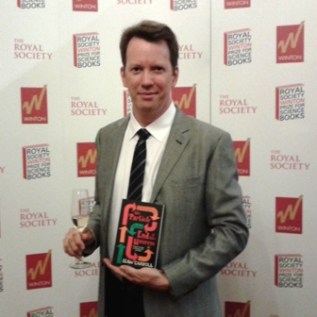
By Margaret Harris
It’s been a good year for particle-physics prizes, and the Higgs-stravaganza continued last night in London as the cosmologist and author Sean Carroll walked away with the £25,000 Royal Society Winton Prize for his book The Particle at the End of the Universe.
Carroll’s book – which includes a behind-the-scenes account of how the Higgs boson was discovered, as well as explanations of the Higgs field and other concepts – was the “unanimous” choice of the prize’s five-member judging panel. Uta Frith, an emeritus professor of cognitive psychology at University College London and the judging panel’s chair, called The Particle at the End of the Universe “a real rock star of a book,” and cited Carroll’s energy and passion for his subject among the reasons why it beat out the five other books on the shortlist.
Before the winner was announced, each of the six shortlisted authors read an excerpt from their books and chatted with the evening’s master-of-ceremonies, comedian Dara O’Briain. The shortlist was dominated by books on nature and the environment – including one, Tim Birkhead’s Bird Sense, which had been the bookies’ 3/1 favourite – so at the reception afterwards, I asked Carroll what it was like to be the only physics writer in the running. “The Higgs boson is not as relatable as fish or memory, so it’s very touching that people ‘get’ it,” he told me. “It’s great that they appreciate that we are made of these little particles and they really do have something to do with us and it’s important to learn about them and to understand what knowledge we’ve gained.” (You can listen to the rest of the interview by clicking below.)
The ceremony itself didn’t go quite as smoothly as its organizers might have hoped: a PowerPoint mistake meant that the audience saw an image of the cover of Carroll’s book just as Royal Society president Paul Nurse was insisting that nobody in the hall except the judges knew the winner’s identity. But as O’Briain joked afterwards, the glitch was appropriate in some ways, since “we all knew before [the July 2012 CERN press conference] that it was going to be the Higgs boson, but we still had to wait for the announcement”.
Speaking of waiting for announcements, science-book fans have another one to look forward to later this week, when we will announce the shortlist for Physics World’s 2013’s “Book of the Year”. Our award hasn’t been around as long as the Royal Society’s, and with a grand total of £0 at stake, it’s much less lucrative. However, it’s the only one we know of that focuses solely on physics books, so watch this space to see if your favourite has made it onto the list.



